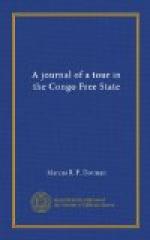It is indeed becoming apparent that the Government is a veritable parent and a stern one also. However, as we promise to be good boys we are permitted to carry a few cases of whisky and wine—after paying the duty—to act as medical comforts. in case of sickness. These medical comforts are also a feature of the State, each white being allowed a bottle or two of champagne and port every three months. Every official indeed receives much kindness and consideration from the State but is severely punished any lapse of duty. The whites are fined for carelessness or negligence, by stopping their pay for a certain number of days, and for serious offences any official may be revocated, when he will perhaps lose six months’ or even a years’ pay. Offences against the penal laws are of course punished by imprisonment.
An excellent institution in Boma is the colonie scolaire where foundlings are reared and educated. Orphans, deserted children, half-castes, all are received and trained for some useful purpose, some entering the army, some engaging on the plantations, some becoming servants to the officials.
It is impossible to form any idea of the Congo native in Boma, for the blacks are of very different nationalities. Natives from Lagos, Sierra-Leone, Portuguese and French territory, all are attracted by the high wages to be earned in the town. Indeed at present most of the positions of responsibility, requiring a fair education, are held by foreign blacks, for very few true Congolese can be trusted. The personal servants we engaged were thus all foreigners in the State service. Two rejoiced in the names of Chikaia and Jean, and acted as boys. i.e. as valets, butlers and general servants while Luembo was cook, and Mavunga, washerman. Each one had a formal contract of five articles signed by us, by a delegate for the Governor General, and by the Judge of Premiere Instance, whose duty it was to see the contract was not broken. The State indeed, superintends everything even to the finding and engaging of private servants for travellers. The wages earned by these boys are very much higher than servants receive in India or China. The cook was paid 35 francs and the others 25 francs per month and all found.
The Customs, the Post Office, and the Land Office, are all conveniently situated in one building on the beach near to the landing pier. In the latter, all the landowners in the State are registered, careful maps being prepared showing the extent and position of each plot of land. The land laws are very simple. The villages are the absolute freehold property of the natives, and are registered in the names of the Chiefs. Vacant lands as usual are the property of the State and the Chartered Companies, Missionaries, and Traders, as a rule, are annual leaseholders but the lease is always renewed if the conditions on which it is granted are observed.




